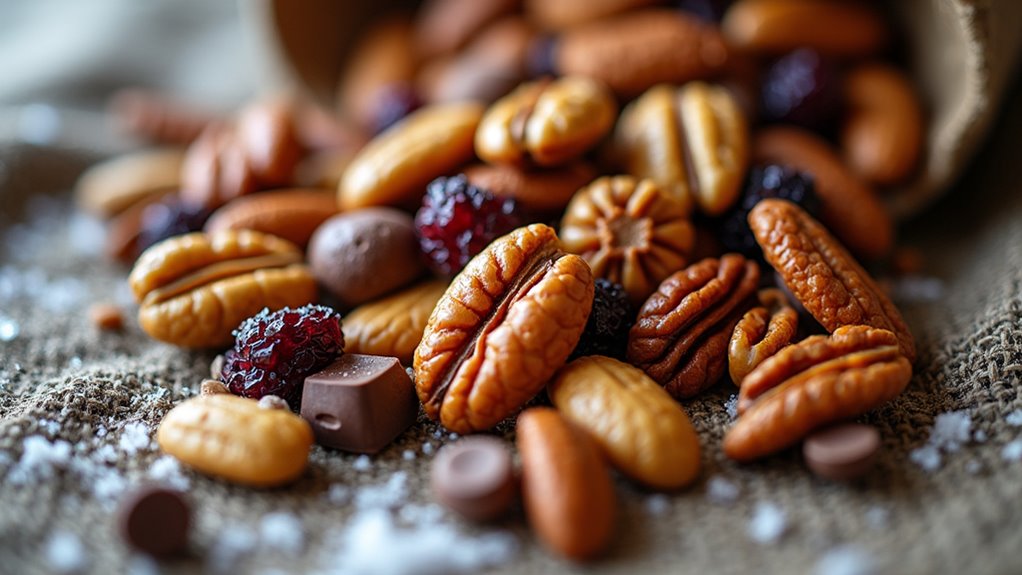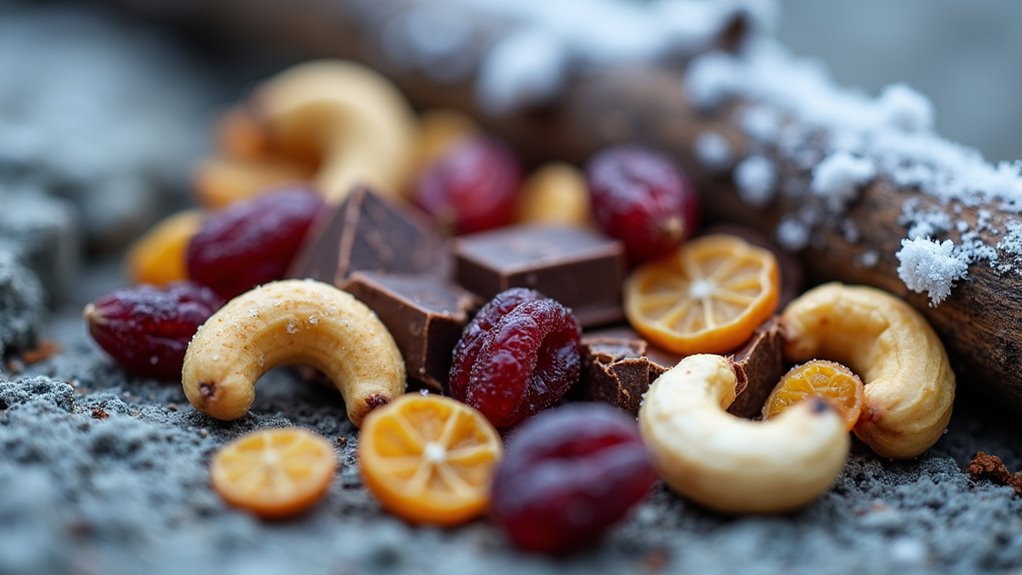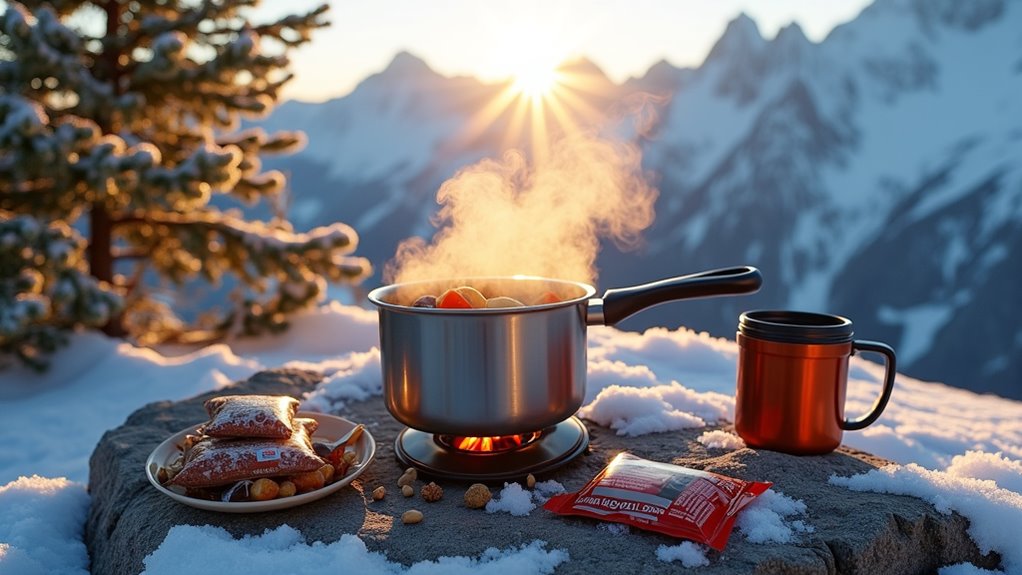Physical Address
304 North Cardinal St.
Dorchester Center, MA 02124
Physical Address
304 North Cardinal St.
Dorchester Center, MA 02124

Get the winter camping fuel secrets that prevent frozen meals and energy crashes when temperatures plummet below zero.
When Sarah’s granola bars turned into frozen hockey pucks during her January backcountry trip, she learned the hard way that regular camping food won’t cut it in winter conditions. You’ll need foods that stay soft in sub-zero temps, pack serious calories, and won’t require complex cooking when your fingers are numb. The wrong choices can leave you hungry and dangerously low on energy, but smart selections will keep you fueled and warm throughout your cold-weather adventure.

When temperatures drop below freezing, your carefully packed trail mix turns into frozen chunks and your energy bars become brick-hard obstacles between you and much-needed calories. You’ll need foods that stay flexible and edible in subzero conditions while delivering maximum energy.
Nut butters are your best friend—they won’t freeze solid and pack serious calories. Squeeze packets work great and won’t break. Cheese stays pliable in cold weather and provides fats you’ll desperately need. Dried salami and jerky remain chewable even when frozen.
For carbs, choose soft cookies over hard granola bars. Instant oatmeal packets mixed with powdered milk create warm, calorie-dense meals. Don’t forget chocolate—dark varieties stay softer than milk chocolate and provide quick energy when you’re burning through calories staying warm.
If you’re planning more extreme winter adventures like glacier climbing, you’ll need even more calorie-dense options to fuel the intense physical demands of navigating icy terrain.
While cold-weather calories keep your body fueled, nothing beats a steaming mug or hot meal for warming you from the inside out and boosting morale when temperatures plummet. You’ll want instant options that cook quickly and conserve fuel. Oatmeal packets, ramen noodles, and dehydrated soups are budget-friendly staples that pack light.
Instant mashed potatoes mixed with cheese powder create a satisfying, warming meal. For beverages, bring hot chocolate packets, instant coffee, and herbal teas. Add powdered milk or creamer for extra calories and richness.
Pre-cut vegetables at home to speed cooking time. One-pot meals save cleanup and fuel. Always pack extra fuel for your stove—cold weather reduces efficiency, and you’ll consume more hot drinks than expected. Consider renting camping gear like specialized winter cooking equipment if you’re new to cold-weather camping or want to test gear before purchasing.

Between those warming meals, you’ll need portable snacks that deliver fast energy to keep your body heat cranked up during winter activities. Pack nuts, dried fruits, and energy bars in your pockets where body heat prevents freezing.
Trail mix with chocolate chips provides quick carbs and healthy fats without breaking your budget.
Jerky offers protein that sustains energy longer than sugary snacks alone. Peanut butter packets squeeze easily even when cold and pair perfectly with crackers or bread.
Don’t forget hard candies – they’re cheap, lightweight, and give instant glucose when you’re feeling sluggish.
Keep snacks accessible in outer pockets so you won’t need to dig through your pack with frozen fingers. Eat small amounts frequently rather than waiting until you’re already cold and tired.
Just like deciding whether to rent or buy equipment for seasonal activities, consider your winter camping frequency when investing in premium trail snacks versus basic options.
Since freezing temperatures can turn simple meal prep into a frustrating challenge, you’ll need to adapt your cooking methods and storage tactics to work with winter’s harsh conditions.
Keep your stove and fuel warm by storing them inside your sleeping bag overnight. Cold fuel burns inefficiently, wasting money and time. Use a windscreen to protect flames from gusts that steal heat.
Store food inside your tent or pack—never leave it outside where it’ll freeze solid. Liquids like cooking oil and condiments need special attention since they’ll turn unusable when frozen. Keep water bottles inverted so ice forms at the bottom, leaving the cap accessible.
Pre-cook ingredients at home when possible. One-pot meals minimize cleanup and conserve fuel, stretching your budget further while reducing time spent cooking in brutal conditions.
These family camping tips can be adapted for winter conditions to help ensure your cold-weather adventure remains enjoyable and well-fed.

Your trip’s length dramatically shapes what you’ll pack in your food bag, from weekend getaways requiring minimal prep to week-long expeditions demanding careful calorie calculations.
For 1-2 day trips, you can afford heavier fresh foods and pre-made meals. Pack items like sandwiches, cheese, and leftover pasta. Don’t worry about spoilage since you’ll consume everything quickly.
3-5 day excursions require balancing weight with nutrition. Mix dehydrated meals with shelf-stable options like nuts, dried fruits, and instant oatmeal. You’ll need roughly 3,000-4,000 calories daily.
Week-long adventures demand lightweight, calorie-dense foods. Focus on freeze-dried meals, energy bars, and healthy fats like olive oil and nut butters. Plan 4,500+ calories per day and include comfort foods for morale.
If carrying and preparing all these supplies feels overwhelming, consider RV camping as an alternative that allows you to bring fresh ingredients and use full cooking facilities while still enjoying winter outdoor adventures.
You’ve got your high-energy nut butters tucked deep in your jacket, that steaming cup of cocoa warming your frozen fingers, and trail mix that won’t turn to ice cubes overnight. But here’s what separates successful winter campers from those who bail early: knowing which foods will fuel you when temperatures plummet and your body’s burning calories like a furnace. Master these food strategies, and you’ll conquer winter’s harshest challenges.